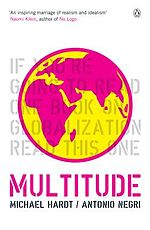- Multitude: War and Democracy in the Age of Empire
-
Multitude: War and Democracy in the Age of Empire 
Author(s) Michael Hardt and Antonio Negri Country United States Language English Subject(s) Political Science
Marxism
Globalization
Philosophy
PostmodernismPublisher Penguin Books Publication date 2004 Media type Print (Hardcover & Paperback) Pages 448 pp. ISBN 1594200246 OCLC Number 54487542 Dewey Decimal 321.8 22 LC Classification JC423 .H364 2004 Multitude: War and Democracy in the Age of Empire is a book written by Antonio Negri and Michael Hardt published in 2004. It is a sequel to the 2000 book, Empire.
Contents
Context
Empire analyzed the formation of a new global geopolitical order, an apparently chaotic set of controls and representative organizations which, on closer inspection, forms a pyramidal power-structure that is composed of three progressively broader tiers:
- A replica of Polybius’ description of Roman government, the only remaining superpower, the United States, followed closely by a handful of other nation-states (roughly, those represented in the G8). Together they control the primary global monetary instruments, and a handful of supranational institutions such as the World Trade Organization, NATO, and the International Monetary Fund.
- The aristocratic tier, in which resides transnational corporations and the general set of sovereign nation-states.
- The democratic-representational comitia—the United Nations General Assembly, religious organisations, the media, and Non-governmental organizations, which together are supposed to represent the People in the global constitution.
It is in this last tier that, albeit indirectly, the multitude appears as the "Other of the People": “The democratic forces that in this framework ought to constitute the active and open element of the imperial machine appear rather as corporative forces, as a set of superstitions and fundamentalisms, betraying a conservative, when not downright reactionary, spirit. […] This limited sphere of imperial ‘democracy’ is configured as a People (an organized particularity that defends established privileges and properties) rather than as a multitude (the universality of free and productive practices).”[1] It is the role of Empire to mold the multitude, via mechanisms of representation, into a People, to transcendentally confiscate the ostensibly chaotic and thus ‘dangerous’ immanent force of the multitude and reconfigure (or reterritorialize) its multiplicity into one will. Empire, Hardt and Negri write, is an apparatus of capture that lives off the vitality of the multitude.
The multitude plays a prominent part in Empire, and not in the least for its revolutionary potential to establish what Baruch Spinoza called an absolute democracy, to subvert the allegedly post-disciplinary societies of control and their concomitant biopower--in short, to attack post-industrial capitalist hegemony with effective weaponry.
Hardt and Negri conclude their analysis with a chapter that focuses directly on the multitude and end with an optimistic outlook:
"Certainly, there must be a moment when reappropriation [of wealth from capital] and self-organization [of the multitude] reach a threshold and configure a real event. This is when the political is really affirmed—when the genesis is complete and self-valorization, the cooperative convergence of subjects, and the proletarian management of production become a constituent power. […] We do not have any models to offer for this event. Only the multitude through its practical experimentation will offer the models and determine when and how the possible becomes real."[2]
The book
The rapid growth of the anti-globalisation movement which showed its teeth in the large protests in Seattle in 1999 and in Genova in 2001, along with the creation of the World Social Forum in Porto Alegre, also in 2001, seemed to substantiate the optimistic outlook at the end of Empire. The terrorist attacks on September 11, 2001 seem, however, to have worked as a pivotal point with respect to this development—offering, one might cynically conclude, the dwindling Empire, in a Hobbesian fashion, the chance to defend itself against the multitude through the production of a culture of fear.
Multitude addresses these issues and as such picks up the thread where Empire has left of. In order to do so, Hardt and Negri argue, one must first analyze the present configuration of war and its contradictions. This analysis is performed in the first chapter, after which chapters two and three focus on multitude and democracy, respectively.
Multitude is not so much a sequel as it is a reiteration from a new point of view in a new, relatively accessible style that is distinct from the predominantly academic prose style of Empire. Multitude remains, the authors insist, despite its ubiquitous subject matter and its almost casual tone, a book of philosophy which aims to shape a conceptual ground for a political process of democratization rather than present an answer to the question ‘what to do?’ or offer a program for concrete action.
Notes
External links
- Review of Multitude, by Eric Mason
- The village voice review, by John Giuffo
- A deconstructive reading of Multitude
- "The Collaborator and the Multitude: An Interview with Michael Hardt" Hardt talks about Multitude, the sequel to Empire. (2004)
- Timothy Rayner (2005). Refiguring the multitude: From exodus to the production of norms. Radical Philosophy 131.
Categories:- 2004 books
- Autonomism
- Books about democracy
- Books about United States foreign relations
- Imperialism
- Political books
Wikimedia Foundation. 2010.
